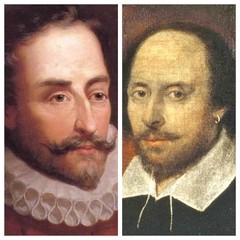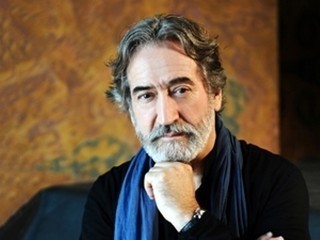|
Back
A Modest Nobel Prize Proposal New York
The Grace Rainey Rogers Auditorium, Metropolitan Museum of Art
01/30/2016 -
“Shakespeare and Cervantes: Dreams and Follies”
Robert Johnson: The Nobleman
John Dowland: Now, o now I needs must part – Lachrimae Antiquae-The King of Denmark’s Galliard
Richard Nicholson: Joan, quote John
William Brade: The Satyr’s Dance
William Byrd: La Virginella: Orlando Furioso
Anon: Paduana del Re-Galliard La Traditora – The Dark is My delight – (Sephardic) Ancient Balls of Lancelot – Ballad of Abindarrez – Ballad of the Twelve Peers of France and Roncesvaux: In Alventosa’s fields – Echo roundelay: Jealous of your gaze
Francisco de Salinas: Ballad of Count Claros of Montalban
Antonio Martín y Coll: El Villano: Chaconne
Jordi Savall (Treble Viola da Gamba, Director, Program Concept and selection of texts), Robert Mealy (Musical Preparation), Alejandro Rodriguez, Angelina Impellizzeri (Actors), Jacqueline Horner-Kwiatek, Kelsey Lauritano, Avery Amereau (Mezzo-sopranos), Lluis Vilamajo, Ryan Brideau (Tenors), Dmitri Katotakis (Baritone), Bruce Dickey (Guest Cornetto), Enrike Solinis (Guest Continuo), David Mayoral (Guest Percussion), Musicians of Juilliard415

C. Cervantes/W.Shakespeare (© Wikipedia.org)
MIGUEL DE CERVANTES (to Shakespeare): “The language barrier is in the soul, not the tongue and teeth.”
WILLIAM SHAKESPEARE (to Cervantes): “Do not you talk to me of the soul. You Spaniards see God as a foul father...”
MIGUEL DE CERVANTES: "You English are incapable of accepting God at all. You do not suffer and you cannot make comedy out of what does not exist in your green and temperate land.”
Anthony Burgess: A Meeting in Valladolid
Cervantes and Shakespeare met, to my knowledge, only twice. Once was in Anthony Burgess’s fanciful, short story from his book of fictional meetings, The Devil’s Mode. The second meeting was last night, when Jordi Savall, his soloists and members of Juilliard’s415 put the two contemporaneous Bards on one musical stage in the Metropolitan Museum of Art.
While I love Burgess, Mr. Savall deserves the almost religious reverence which I will offer in the closing paragraph. For this performance, though, he created a two-hour accumulation (far too short) from two of the three indisputable giants of the 16th Century. Rabelais will have to wait for another time.

J. Savall (© Courtesy of the Artist)
The first hour, with Shakespeare readings and music of his time, was, indeed temperate and lyrical. The poetry, like all Elizabethan art, was metaphorical, the images were of nature, the melodies were intertwined like a wreath of flowers. The harmonies consonant, the counterpoints as transparent and complex as the rhymes.
The Spanish readings came from Don Quixote. They were ribald, ridiculous, they had the mock-grandeur and mock-eloquence which (except for Falstaff) Shakespeare confined for his minor characters. The music was neither soothing nor complaisant. Those Berber and Sephardic rhythms (yes, the Moslems and Jews had been thrown out of Spain, but their art remained) were preponderant, the emotions turned from tragic to triumphant. These were not idylls for shepherds and shepherdesses from the Blessed Isle with which Spain was constantly at war. They spoke of seductions and beheadings, chivalry and warfare.
And with his splendid group of soloists and artists, Jordi Savall provided a time machine view of the great powers of that time.
First, he had Juilliard415, a 30-person group which was probably ten times the measure of 16th Century original ensembles. The modest Mr. Savall led the youthful violas da gamba, including treble, tenor and bass gambas (who knew?), two lutes, while the winds included different size shams, dulcians and recorder. Then we had sackbuts, cornetto, continuo and a fabulous percussion group. The latter giving royal riffs, castanets (for the Spanish section, of course) and all the rhythms necessary.
The six singers were not listed for each song, so I can only say that they blended into the English numbers with milky creamy harmony. The Spanish songs were more dramatic: the soloists took the roles of seduced maiden, king, narrator. In the “Romance of Count Claros”, music and words were particularly affecting. A young princess seduced, the seduction reported to the king, the seducer sentenced to die, until...
Well, until the Princess “humbly pleads” for her father to “not in anger judge.” He doesn’t judge, and the whole narrative ends in joyous dancing.
In between, two actors read passages which vaguely mirrored the music. Angelina Imprellizzeri was striking, emotional, did her Shakespeare well. Alejandro Rodriguez was unsuited for Shakespeare (high voice, little variation), but in Cervantes’ readings became the characters, the tempos were right for the music to follow.
And what was that music? None of the few examples of music in Shakespeare were played, but Dowland was the Bard’s favorite. His Lachrimae Antiquae was for instruments, but we know it better as Follow Your Saintwhose plaintive words should have been sung.
The other composers lived a bit later than Shakespeare, but so appealing was this golden age of music, that it was performed all the way up to Purcell. In fact, William Brade’s Satyr’s Dance was the delicious precursor of Purcell’s Witch’s Dance, with a marvelous Jews Harp solo from the percussion section.
While that music was never tiring, the dances and epics and stories from Cervantes to me topped the bill. They were all written by Mr. Anon, except for that early epic of the princess, written by Francisco de Salinas. Yet in each one, the lutes and drums dominated, the rhythms of Juilliard415 were accented, one felt like joining the dance.
And in re-reading Don Quixote as well.
This was music which didn’t “evoke” times past. They were times past, and had the auditorium been dark, one could have been in the Globe Theater, or in the bullfighting ring where Don Quixote was acted out.
As for Mr. Savall, who sat so modestly with his string players, lightly conducting when he wasn’t playing, he, more than any person I know, deserves the Nobel Peace Prize. For nearly 50 years, this Catalan-born musician and his late wife Montserat Figueras have been bringing together Ottoman Turks and Byzantine Greeks, Sephardic Jew and Shia Moslem, Asia, Asia Minor, Europe, the pre-and post-Columbian New World, warriors and troubadours, musics of a hundred people and a thousand years. Together with art, adoration, sensibility, sensuousness, and the passion of sheer beauty.
With rare exceptions, nobody has encompassed the word “peace” with such breadth and such beauty, and oh, how we were privileged to hear him once more.
Harry Rolnick
|